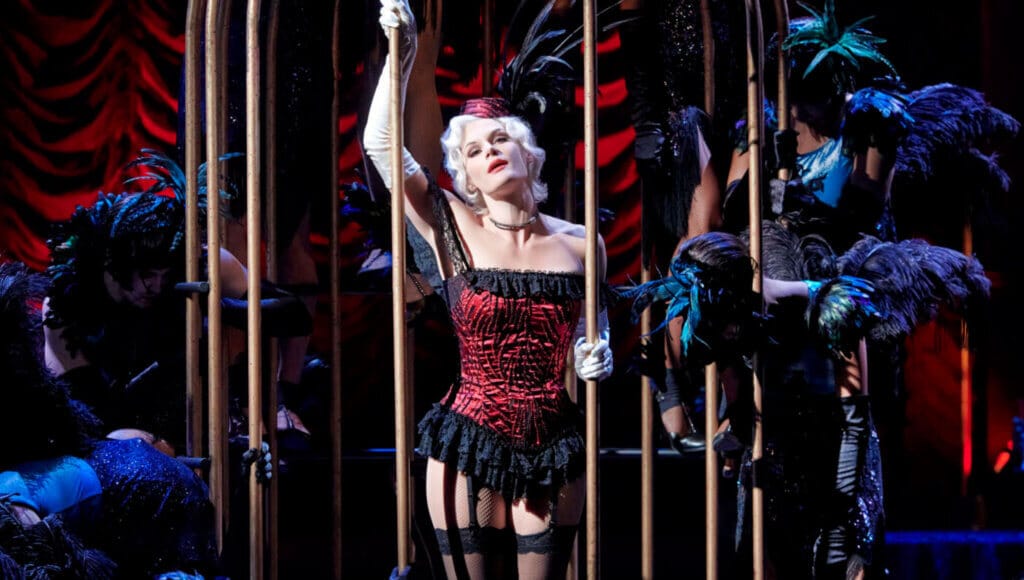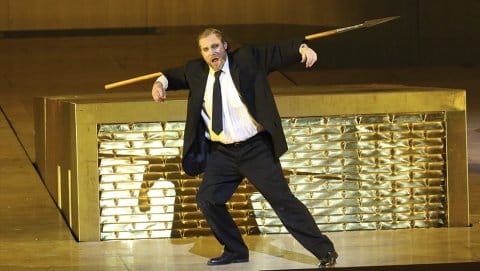CABARET • GOTHENBURG OPERA
★★★★☆☆

Photo: Lennart Sjöberg
REVIEW CABARET: WELL-OILED MUSICAL MACHINE LACKS NERVE
Impressive large-scale scenography, marvelous costumes and swirling, beautifully executed ensemble numbers send the popular Love & Dance musical Cabaret flying on this rainy Wednesday in Gothenburg’s well-attended opera house. Unfortunately, despite much exterior pomp, the show doesn’t quite reach the heights.
Cabaret is a trembling tale of doom from the 1930s, in a throbbing, chaotic Germany between two world wars, where moral concepts are challenged, sexual boundaries are pushed, and love is hard to come by. We are sucked into Berlin’s raucous underground, where villains, harlot and terrifying fates go at it, while the Nazi counterculture gains a foothold.
Despite a well-oiled and super professional musical machine staging, the show is strangely lacking some nerve and real intimacy on the Gothenburg Opera’s big stage, just as one searches valiantly for solo performances that rise to the extraordinary. Cabaret has been playing here at the opera since December and is perhaps a little routine.
The costumes are glitteringly festive without being overwhelming and perhaps you’re no longer reeling from the shock of seeing half-naked men kissing each other wearing S/M style lederhosen, leather masks and studded dog collars.
The plot is driven by two different but interconnected love stories.
On the one hand, the love story between the sexy but haggard cabaret star Sally Bowles and the budding American writer Clifford Bradshaw in search of inspiration for his novel. A relationship that never comes close to being believable and ends up as a heart without pain.
On the other hand, Fräulein Schneider, the landlady, and Schultz, the Jewish greengrocer, seem at times overplayed in a folk-comedy way and contrast in level with the overblown mass choreography of the Kit Kat Klub’s fast-paced dance numbers.
One is left with a hollow feeling that Cabaret may not be such a good musical when it comes down to it. I’ve even read an acidic online commentary that suggests Cabaret is only immortal because no one let it die, but I think that’s a stretch.
The 1966 musical is based on the autobiographical novel Farewell to Berlin, and later became Liza Minelli’s breakthrough role in Bob Fosse’s famous film adaptation, who brilliantly executes the hit numbers Wilkommen, Bienvenue, Welcome, Welcome, Don’t Tell Mama and all the others.
Cabaret is frequently performed on international stages and is currently enjoying great success in London, where I saw a slightly more intimate, five-star version last autumn.
The current version at Göteborg Opera is favored by a large cast and a full orchestra, both in the pit and on stage, ensuring an effective musical impact.
As the demonic emcee, Michaela Sjöstedt (cover) has an energetic expression, while Kerstin Hildén as Sara Bowles has all the overdone sex appeal and porcelain-like fragility that characterizes the role.
The finale impresses with the signature number Life Is A Cabaret in a top-notch staged dance extravaganza that cleverly fades into a striking finish with the entire cast on stage in the striped prison garb of the Nazi concentration camps.
A warning of where it’s all heading – and what happens when you don’t speak out against totalitarian regimes in time.
Despite its drawbacks, this is a good evening of musicals, with the audience responding with less enthusiastic applause than one would expect in musical-loving Sweden.

PROSECCO LUNCH BEFORE THE GOTHENBURG OPERA
If you have time for lunch before your performance at the opera, I recommend a visit to Hedlunds Havsbar
I rained in here for a couple of hours (what a shame) in good company with glorious Swedish oysters, freshly shucked prawns, and a classic serving of gravlax with fox sauce and chive stewed potatoes. Why not.
A busy atmosphere at the dining bar, fine service and good Prosecco by the glass put the icing on the cake.
Hedlunds is located in Stora Saluhal (market hall) in the centre of an excellent, if conventional, shopping area where you can celebrate the low Swedish krona exchange rate.
If you’d rather dine at the Opera House before theatre time, go light with the restaurant’s avocado salad topped with Swedish mozzarella (!) in a beautiful finish.
More substantial is the kitchen’s traditional serving of tender duck breast with sweet potato and greens in a classic but very tasty glace.
The selection of wines by the glass is excellent and the prices reasonable.




